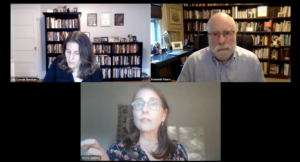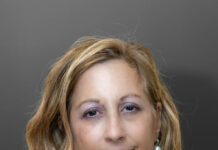
An April 20 online event hosted by Congregation Rodeph Shalom was meant to educate congregants about the potential for free speech issues surrounding the International Holocaust Remembrance Alliance Working Definition of Antisemitism.
In the days before it began, the event drew criticism from some letter-writers and Jewish organizations who characterized it as “strongly biased against Israel and Jews,” as one statement put it, taking issue with both the subject matter and the panelists themselves.
The panelists and organizers vehemently dispute that notion.
The controversy surrounding the event is a miniaturized version of fights that have roiled British and American politics in recent years about how to understand the connection between Israel and anti-Semitism, fights that have often asked thorny questions about free speech, academic freedom and campus politics. In Philadelphia, this most recent controversy has a local flavor, as critics of the event charged its panelists and organizers with disrespecting the memory of Murray Friedman, a local Jewish scholar of national repute. The panelists and organizers deny that charge, too.
The event, “The Weaponization of Discourse: Israel/Palestine, Antisemitism, and Free Speech on Campus,” was co-hosted with Temple University’s Feinstein Center for American Jewish History and the Holocaust and Genocide Studies Program at Stockton University.
Panelists Joyce Ajlouny, general secretary of the American Friends Service Committee, and Kenneth S. Stern, director of the Bard Center for the Study of Hate at Bard College, discussed the IHRA definition of anti-Semitism for about an hour.
Stern was one of the original drafters of the IHRA definition of anti-Semitism. In 2004, the European Monitoring Centre on Racism and Xenophobia, the European Union’s racism and xenophobia monitor, sought guidance from Jewish academics and NGOs in providing an update to the definition of anti-Semitism. Stern and his co-drafters produced this 38-word statement:
“Antisemitism is a certain perception of Jews, which may be expressed as hatred toward Jews. Rhetorical and physical manifestations of antisemitism are directed toward Jewish or non-Jewish individuals and/or their property, toward Jewish community institutions and religious facilities.”
Alongside that statement, Stern and the co-drafters provided 11 illustrative examples of anti-Semitic statements. Seven of the 11 mention bias relating to Israel as potentially anti-Semitic in nature.
The IHRA definition, as Stern said again during the April 20 event, was not meant to be given the force of law, but simply to serve as a guide for monitoring purposes.
But since its publication in 2004, governments worldwide have formally adopted the IHRA definition, concerning a wide range of academics and activists, from pro-Palestinian activists to libertarians.
In the U.S. and abroad, Stern said, the worry is that providing the IHRA definition with legal force could, in effect, create a new category of legally prohibited speech, thereby stifling freedom of speech and academic freedom. Stern contends that groups who would find it in their interest to silence speech that criticized Israel could use the newly empowered definition, adopted by the U.S. government via a 2019 executive order, to threaten pro-Palestinian speakers with legal action.
Even as a Zionist who still finds the original definition useful for understanding anti-Semitism, Stern wrote in a 2019 op-ed for The Guardian, he finds the prospect that it would be used to suppress the speech of anti-Zionists to be fundamentally wrong.
“To establish that as a principle of law is, to me, abhorrent,” Stern said during the panel.
Stern was joined by Ajlouny, born in Ramallah, who has led the AFSC since 2017. The Quaker organization has long championed the cause of the Palestinians, and Ajlouny was director of Ramallah Friends School.
While director, Ajlouny started “Go Palestine,” a summer camp for Palestinian students. The camp, partially funded by USAID, became a target for criticism from U.S. government officials when the programming content was revealed in a 2017 JNS article. Speakers had advocated for the boycott, divestment, sanctions movement, and one speaker, Nassar Ibrahim, was affiliated with the Popular Front for the Liberation of Palestine, a Department of State-designated terrorist group.
During the panel, Ajlouny said that she, like Stern, believed that legally codifying the IHRA definition had unfairly privileged a single point of view. But unlike Stern, Ajlouny is a declared anti-Zionist, and said that “constant accusations” of anti-Semitism against Palestinians and their supporters brought to mind “the boy who cried wolf.” Throughout the panel, Ajlouny shared her personal experience of life in Ramallah living “in an apartheid system,” she said. “If I talk about my personal story, I am accused of being an anti-Semite,” Ajlouny said.
Criticism of the event rolled in well in advance.
Moshe Phillips, national director of Herut North America’s U.S. division, wrote in the Jewish Journal that he’d “expect Arab propagandists to spread such lies,” referring to a line in the event description that mentioned “state violence against Palestinians.”
In another op-ed after the event, Phillips accused Ajlouny of displaying “Phony Martyr Syndrome,” and characterized the event as “90 minutes of Israel-bashing disguised as an academic discussion.”
In addition, Zionist Organization of America National President Morton A. Klein and Center for Law and Justice Director Susan B. Tuchman wrote in an open letter that “there is no doubt that the program will be one-sided and hostile to Israel — and potentially harmful to American Jews.” ZOA Philadelphia Executive Director Steve Feldman said the only room for discussion on the IHRA definition should be “in order to strengthen it, and expand local government, state governments and universities embracing it and adopting it.”
The American Jewish Committee described the event as “strongly biased against Israel and Jews” and took particular issue with the involvement of the Feinstein Center. The center was founded by Murray Friedman, a scholar who led AJC Philadelphia for 43 years.
“Hosting a program that is a blatant attack on Israel and questions the most widely accepted definition of antisemitism is an assault on Murray Friedman’s legacy, and all in our community who have been involved with the Feinstein Center for years,” AJC Philadelphia Director Marcia Bronstein said in a statement. She said that she had requested that another speaker be added to the program, but was rebuffed.
Congregation Rodeph Shalom Senior Rabbi Jill Maderer said that the synagogue received many emails using the same language, describing the Stern and the organizers as self-hating Jews, among other charges.
Stern, Ajlouny, Maderer and Feinstein Center Director Lila Corwin Berman each reported their dismay with the criticism.
Stern was particularly dismayed by the AJC’s criticism; Stern was the national AJC’s expert on anti-Semitism for 25 years. He stressed that there were real points of disagreement between him and Ajlouny on the content of the definition and on other matters relating to Israel, and that the charge that the event would have been objectionable to Murray Friedman was false.
The rancor over this particular event, Stern believes, “is a reflection of exactly the danger” of giving the IHRA definition the force of law, “the idea that you can’t even have a discussion about whether a particular definition has a positive or negative impact on combating anti-Semitism.”
Ajlouny said she wasn’t particularly surprised by the backlash.
“It affirms that the attempt to silence narratives is alive and well,” she said.
Academic freedom was also on Berman’s mind.
“Academic institutions generally do not respond to external pressure to change the contents of classes or the contents of programs,” said Berman, who also holds the Murray Friedman Chair of American Jewish History.
Rodeph Shalom hosts many educational events related to Israel that represent a wide variety of perspectives, Maderer said; recent speakers have included Asaf Romirowsky, a fellow at the Middle East Forum, and Israel Defense Forces veterans who are a part of Breaking the Silence. Such speakers always attract controversy, she said.
“If the only ideas I brought in about Israel excluded any tough truths about the territories, let’s say, then I would be missing out on the next generation of the Jewish community,” Maderer said.
[email protected]; 215-832-0740






